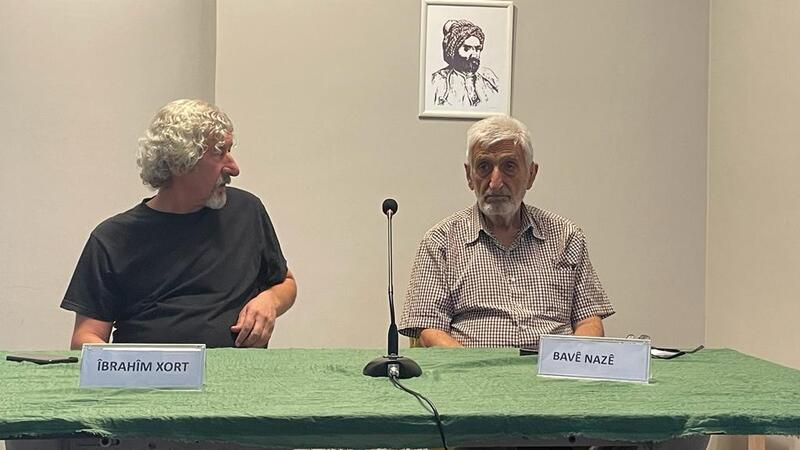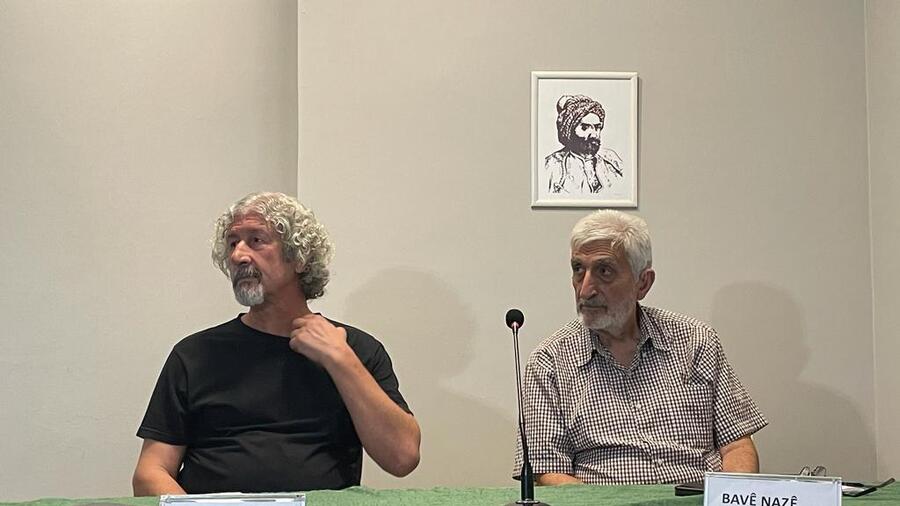Bahram Gardouni
Bave Naze was in Amed.
The writer Bave Naze talked about his writings on September 9 at the Amed Library. He answered questions from the participants and signed his books for them.
I still remember the character of the "drunk philosopher" in Miriyê Heram novel. At four o'clock, I went up the stairs of the Amed Library.
His long beard and white hair matched his skill of more than fifty years of writing. A lifetime of literature that impresses humans.
Its manager, Ibrahim Khort, warned the participants: He is hard of hearing. Raise your voice, sir, raise your voice, a little more. Bave Naze tells me after the conversation ends, “Write your name." I said, "It's an honor to listen to you here today." I write my name, Bahram, and a signature: "Dear Bahram, I enjoy your reading."
The conversation begins. Ibrahim Khort introduces Bave Naze, and then says, “No one accepts other ones.” He describes how everyone is against each other.
Bave Naze starts talking. "Literature is a strange world," he says. "Whenever I write a novel, I don't write the last sentence to avoid it appearing to me."
He knows how to start, how to continue, and how to finish. The details will become clear to him as he writes. Otherwise, we can say that Bave Naze does not write automatically. Before he starts, the map of the novel is drawn.
His first novel, Çiyayên Bi Xwînê Avdayî, was first translated into Arabic in 1978, Russian in 1981, and Kurdish in 1988.
A question is asked: "Is the hero Dara speaking for himself or is he speaking on behalf of his author?" Bave Naze is in doubt about his answer. “It is partially of the author,” he says. “If it’s of the hero, it’s a success, if it’s of the author, it’s a failure,” he says. "But isn’t the position clear?"
According to him, the novel should correspond to the reality of life. We need to have that feeling, that instinct in us to be affected.

"Novels and stories should play the role of stabilizing language. Literature is an art of expression." Bave naze maintains the standard of the language; if that criterion is not met, understanding other dialects will not be achieved. “Why should we have four literary languages?” he asks.
Bave Naze is not only a writer but also, he was a university professor in the South part of Kurdistan. He has prepared six or seven textbooks on language and literature. He prepared a five-volume literary book from the beginning to the 20th century.
Ibrahim Khort talks about a memory. Bave Naze asks his students, “Who has read novels?” No one raises a hand. "Who has read stories?" No one raises a hand. "Today, the situation in the Southern part of Kurdistan has improved a lot," he says.
It was in 2010 if I’m not wrong. It was a saying of Bave Naze Rojev: "There are no Kurdish novels." When he is asked if he still thinks so, Bave Naze says: "I still say there is not a Kurdish novel. What are its characteristics?"
According to Bave Naze, there is Kurdish poetry, but not Kurdish novels because the Kurdish novel as a literary genre, with all its structure and construction, events, such a distinction has not occurred.
“I do not dare talk about the shortcomings in anyone’s novel,” says Bave Naze. That is why he mentions his novel. "My novel is Kurdish literature, Kurdish language." He asks, "What is the difference between Kurdish novels and the world's novels? Is there a difference?"
"Translation. Let's translate what is written," says Bave Naze.
I come down from the library of Amed with a book. My mind is full of questions. I sit in a cafe and order a cup of tea.









